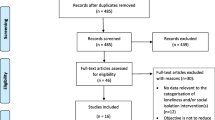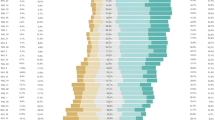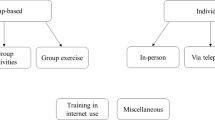Abstract
To cross-culturally adapt and validate the original English version of the Short Falls Efficacy Scale-International (SFES-I) to the Igbo culture and environment. The study was a cross-cultural adaptation and validation study that employed the guidelines for cross-cultural adaptation by the American Academy of Orthopedic Surgeons. The SFES-I was translated, adapted and validated. The English (E-SFES-I) and Igbo (I-SFES-I) versions of the SFES-I, and the Modified Falls Efficacy Scale were administered to purposively recruited 109 consenting older adult residents (53.2% females; mean age = 73.75 ± 7.63 years) of Nnewi community, South-east Nigeria. Descriptive statistics and graphs were used to summarize participants’ socio-demographic and questionnaire data. Mann Whitney-U test, Spearman rank order test, principal component analysis and Cronbach’s alpha were used to analyze data at alpha level of 0.05. All the seven items on the E-SFES-I were retained on the I-SFES-I. There was no significant difference between the scores on the E-SFES-I and the I-SFES-I (p > 0.05). The I-SFES-I showed evidence of excellent known-group validity (ρ = 0.96–1.00) in all the item and total scores. The I-SFES-I also demonstrated excellent convergent validity (rho = 0.93) and internal consistency (α = 0.96). The I-SFES-I is a valid and reliable fear of falling tool, and can be used as an outcome measure for Igbo-speaking older adults.




Similar content being viewed by others
Availability of Data and Materials
The dataset used and/or analysed during the current study are available from the corresponding author on reasonable request.
References
Akosile, C. O., Agu, C. U., Adegoke, B. O. A., Okoye, E. C., Okeke, I. A., & Emeahara, G. (2014a). Physical Activity, Fear of Falling and Falls in Nigerian Older Adults. Ageing and Social Change, 3(2), 25–35. https://doi.org/10.18848/2160-1909/CGP/v03i02/35240
Akosile, C. O., Anukam, G. O., Johnson, O. E., Fabunmi, A. A., Okoye, E. C., Iheukwumere, N., & Akinwola, M. O. (2014b). Fear of Falling and Quality of Life of Apparently-Healthy Elderly Individuals from a Nigerian Population. Journal of Cross-Cultural Gerontology, 29(2), 201–209. https://doi.org/10.1007/s10823-014-9228-7
Akosile, C. O., Odidika, F. J., Okoye, E. C., Adegoke, B. O. A., Maruf, F. A., Oderinde, A. A., Kehinde, A. O., & Raji, N. O. (2015). Physical Function, Fear of Falling, Occupational Status and Falls in a Nigerian Older Adults Sample. Ageing International, 40(4). https://doi.org/10.1007/s12126-014-9202-2
Arafat, S., Chowdhury, H., Qusar, M., & Hafez, M. (2016). Cross Cultural Adaptation and Psychometric Validation of Research Instruments: A Methodological Review. Journal of Behavioral Health, 5(3), 129–136. https://doi.org/10.5455/jbh.20160615121755
Arrindell, W. A., & Van der Ende, J. (1985). An empirical test of the utility of the observations-to-variables ratio in factor and components analysis. Applied Psychological Measurement, 9(2), 165–178. https://doi.org/10.1177/2F014662168500900205
Beaton, D. E., Bombardier, C., Guillemin, F., & Ferraz, M. B. (2000). Guidelines for the process of cross-cultural adaptation of self-report measures. Spine, 25(24), 3186–3191. https://doi.org/10.1097/00007632-200012150-00014
Bédard, A., Garcia-Aymerich, J., Sanchez, M., Le Moual, N., Clavel-Chapelon, F., Boutron-Ruault, M. C., Maccario, J., & Varraso, R. (2015). Confirmatory factor analysis compared with principal component analysis to derive dietary patterns: A longitudinal study in adult women. The Journal of Nutrition, 145(7), 1559–1568. https://doi.org/10.3945/jn.114.204479
Chang, H. T., Chen, H. C., & Chou, P. (2017). Fear of falling and mortality among community- dwelling older adults in the Shih- Pai study in Taiwan: A longitudinal follow- up study. Geriatrics & Gerontology International, 17(11), 2216–2223. https://doi.org/10.1111/ggi.12968
Choi, K., & S, J. G., & Cho, S. I. (2017). Prospective study on the impact of fear of falling on functional decline among community dwelling elderly women. International Journal of Environmental Research and Public Health, 14(5), 469. https://doi.org/10.3390/ijerph14050469
Chua, C. H. M., Jiang, Y., Lim, D. S., Wu, V. X., & Wang, W. (2019). Effectiveness of cognitive behaviour therapy-based multicomponent interventions on fear of falling among community-dwelling older adults: A systematic review and meta-analysis. Journal of Advanced Nursing, 75(12), 3299–3315. https://doi.org/10.1111/jan.14150
Costello, A. B., & Osborne, J. (2005). Best practices in exploratory factor analysis: Four recommendations for getting the most from your analysis. Practical Assessment, Research, and Evaluation, 10(1), 7. https://doi.org/10.12691/jpar-2-1-2
Denkinger, M. D., Lukas, A., Nikolaus, T., & Hauer, K. (2015). Factors associated with fear of falling and associated activity restriction in community-dwelling older adults: A systematic review. American Journal of Geriatric Psychiatry, 23(1), 72–86. https://doi.org/10.1016/j.jagp.2014.03.002
Dewan, N., & MacDermid, J. C. (2014). Fall efficacy scale-international (FES-I). Journal of Physiotherapy, 60(1), 60. https://doi.org/10.1016/j.jphys.2013.12.014
Faul, F., Erdfelder, E., Lang, A. G., & Buchner, A. (2007). G*Power 3: A flexible statistical power analysis program for the social, behavioral, and biomedical sciences. Behavior Research Methods, 39(2), 175–191. https://doi.org/10.3758/BF03193146
Finch, A. P., Brazier, J. E., Mukuria, C., & Bjorner, J. B. (2017). An exploratory study on using principal-component analysis and confirmatory factor analysis to identify bolt-on dimensions: The EQ-5D case study. Value in Health, 20(10), 1362–1375. https://doi.org/10.1016/j.jval.2017.06.002
Heubeck, B. G., & Neill, J. T. (2000). Confirmatory factor analysis and reliability of the mental health inventory for australian adolescents. Psychological Reports, 87(2), 431–440. https://doi.org/10.2466/pr0.2000.87.2.431
Hill, K. D., Schwarz, J. A., Kalogeropoulos, A. J., & Gibson, S. J. (1996). Fear of falling revisited. Archives Physical Medicine, Rehabilitation, 77, 1025–1029. https://doi.org/10.1016/s0003-9993(96)90063-5
Ibikunle, P. O., Odole, A. C., Akosile, C. O., & Ezeakunne, A. C. (2017). Cross-cultural adaptation and psychometric properties of the Nigerian (IGBO) version of the Disabilities of the Arm, Shoulder and Hand questionnaire (I-DASH). Hand Therapy, 22(3), 101–109. https://doi.org/10.1177/2F1758998317709300
Kaiser, H. F. (1958). The varimax criterion for analytic rotation in factor analysis. Psychometrika, 23, 187–200. https://doi.org/10.1007/BF02289233
Kamide, N., Shiba, Y., Sakamoto, M., & Sato, H. (2018). Reliability and validity of the Short Falls Efficacy Scale-International for Japanese older people. Aging Clinical and Experimental Research, 30(11), 1371–1377. https://doi.org/10.1007/s40520-018-0940-y
Kempen, G. I., Yardley, L., Van Haastregt, J. C., Zijlstra, G. R., Beyer, N., Hauer, K., & Todd, C. (2008). The Short FES-I: A shortened version of the falls efficacy scale-international to assess fear of falling. Age and Ageing, 37(1), 45–50. https://doi.org/10.1093/ageing/afm157
Klein, D. F. (2005). Review of beyond significance testing: Reforming data analysis methods in behavioural research. American Journal Psychiatry, 162, 643–644.
Laurie, B. (2007). Language, artsand culture.The linguistics students handbook. https://elearn.univ-ouargla.dz/2013-2014/courses/0608/document/TheLinguisticsStudent_sHandbook.pdf?cidReq=0608
Leipzig, R. M., G, C. R., & ME, T. (1999). Drugs and falls in older people: a systematic review and meta‐analysis: I. Psychotropic drugs. Journal of the American Geriatrics Society, 47(1), 30–39. https://doi.org/10.1111/j.1532-5415.1999.tb01898.x
Marques-Vieira, C. M., Sousa, L. M., Severino, S., Sousa, L., & Caldeira, S. (2016). Cross-cultural validation of the falls efficacy scale international in elderly: Systematic literature review. Journal of Clinical Gerontology and Geriatrics, 7(3), 72–76. https://doi.org/10.1016/j.jcgg.2015.12.002
Moore, D. S., & Ellis, R. (2008). Measurement of fall-related psychological constructs among independent-living older adults: A review of the research literature. Aging and Mental Health, 12(6), 684–699. https://doi.org/10.1080/13607860802148855
National Bureau of Statistics. (2010). The National Literacy Survey. Marketing Communications. www.nigerianstat.gov.ng/pages/download/43.
Okoye, E. C., Akosile, C. O., Maruf, F. A., Onwuakagba, I. U., & Urama, S. T. (2020). Validation of Igbo version of the modified falls efficacy scale among community-dwelling older adults: a validation study. Health and Quality of Life Outcomes, 18(294). https://doi.org/10.1186/s12955-020-01547-1
Okoye, E. C., Oyedum, S. O., Akosile, C. O., Onwuakagba, I. U., Ibikunle, P. O., & Okonkwo, U. P. (2019). Cross-cultural adaptation and validation of the reintegration to normal living index into IGBO language among individuals with mobility disability. Journal of Patient- Reported Outcomes Research, 3(40). https://doi.org/10.1186/s41687-019-0139-9
Oyeyemi, A. L., Oyeyemi, A. Y., Adegoke, B. O., Fatima, O. O., Aliyu, H. N., Aliyu, S. U., & Rufai, A. A. (2011). The short international physical activity questionnaire: Cross cultural adaptation, validation and reliability of the Hausa language version in Nigeria. BMC Medical Research Methodology, 11(156). https://doi.org/10.1186/1471-2288-11-156
Payette, M. C., Belanger, C., Léveillé, V., & Grenier, S. (2016). Fall-related psychological concerns and anxiety among community-dwelling older adults: Systematic review and meta-analysis. PLoS One, 11(4). https://doi.org/10.1371/journal.pone.0152848
Ruggiero, C., Mariani, T., Gugliotta, R., Gasperini, B., Patacchini, F., Nguyen, H. N., Zampi, E., Serra, R., Dell’Aquila, G., Cirinei, E., & Cenni, S. (2009). Validation of the Italian version of the falls efficacy scale international (FES-I) and the short FES-I in community-dwelling older persons. Archives of Gerontology and Geriatrics, 49, 211–219. https://doi.org/10.1016/j.archger.2009.09.031
Scheffer, A. C., Schuurmans, M. J., Van Dijk, N., Van Der Hooft, T., & De Rooij, S. E. (2008). Fear of falling: measurement strategy, prevalence, risk factors and consequences among older persons. 2008;37(1):19–24. Age and Ageing, 37(1), 19–24. https://doi.org/10.1093/ageing/afm169
Tan, M. P., Nalathamby, N., Mat, S., Tan, P. J., Kamaruzzaman, S. B., & Morgan, K. (2018). Reliability and validity of the short falls efficacy scale International in English, mandarin, and Bahasa Malaysia in Malaysia: The International Journal of Aging and Human Development, 87(4), 415–428. https://doi.org/10.1177/0091415017752942
World Population Review, 2020. (2020). Nnewi population 2020. https://worldpopulationreview.com/world-cities/nnewi-population
Yardley, L., Beyer, N., Hauer, K., Kempen, G., Piot-Ziegler, C., & Todd, C. (2005). Development and initial validation of the Falls Efficacy Scale-International (FES-I). Age and Ageing, 34(6), 614–619. https://doi.org/10.1093/ageing/afi196
Young, W. R., & Mark Williams, A. (2015). How fear of falling can increase fall-risk in older adults: Applying psychological theory to practical observations. 2015;41(1):7–12. Gait & Posture, 41(1), 7–12. https://doi.org/10.1016/j.gaitpost.2014.09.006
Author information
Authors and Affiliations
Contributions
All authors contributed to the study conception and design. ‘ECO reviewed literature, collected and analysed data and prepared the manuscript. COA and FAM participated in manuscript preparation. VOO participated in literature review and data collection. KUA participated in manuscript writing. All authors read and approved the final manuscript.’
Corresponding author
Ethics declarations
Conflict of Interest
None declared.
Ethics Approval and Informed Consent
An ethical review board approved this study. Informed consent was obtained from the participants prior to data collection.
Consent for Publication
Not applicable.
Competing Interests
Not applicable.
Additional information
Publisher's Note
Springer Nature remains neutral with regard to jurisdictional claims in published maps and institutional affiliations.
Key Points
• Fear of falling (FoF) is a serious problem that needs regular screening among older adults.
• A culturally-friendly FoF scale had been made available for use in a developing country.
• A short, less burdensome and more acceptable FoF scale has been made available for use in a developing country.
Rights and permissions
Springer Nature or its licensor holds exclusive rights to this article under a publishing agreement with the author(s) or other rightsholder(s); author self-archiving of the accepted manuscript version of this article is solely governed by the terms of such publishing agreement and applicable law.
About this article
Cite this article
Okoye, E.C., Akosile, C.O., Maruf, F.A. et al. Cross-Cultural Validation of Igbo Version of the Short Falls Efficacy Scale-International Among Community-Dwelling Older Adults. Ageing Int 48, 855–871 (2023). https://doi.org/10.1007/s12126-022-09505-6
Accepted:
Published:
Issue Date:
DOI: https://doi.org/10.1007/s12126-022-09505-6




